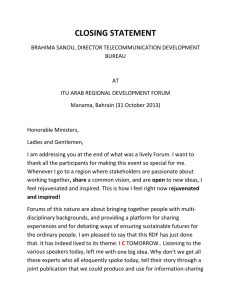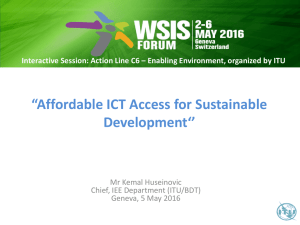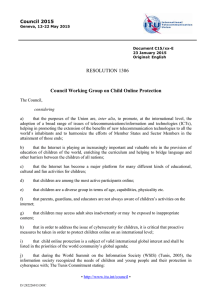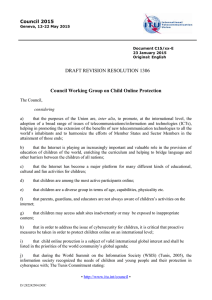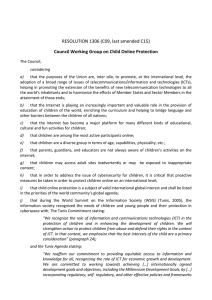OPENING REMARKS
advertisement
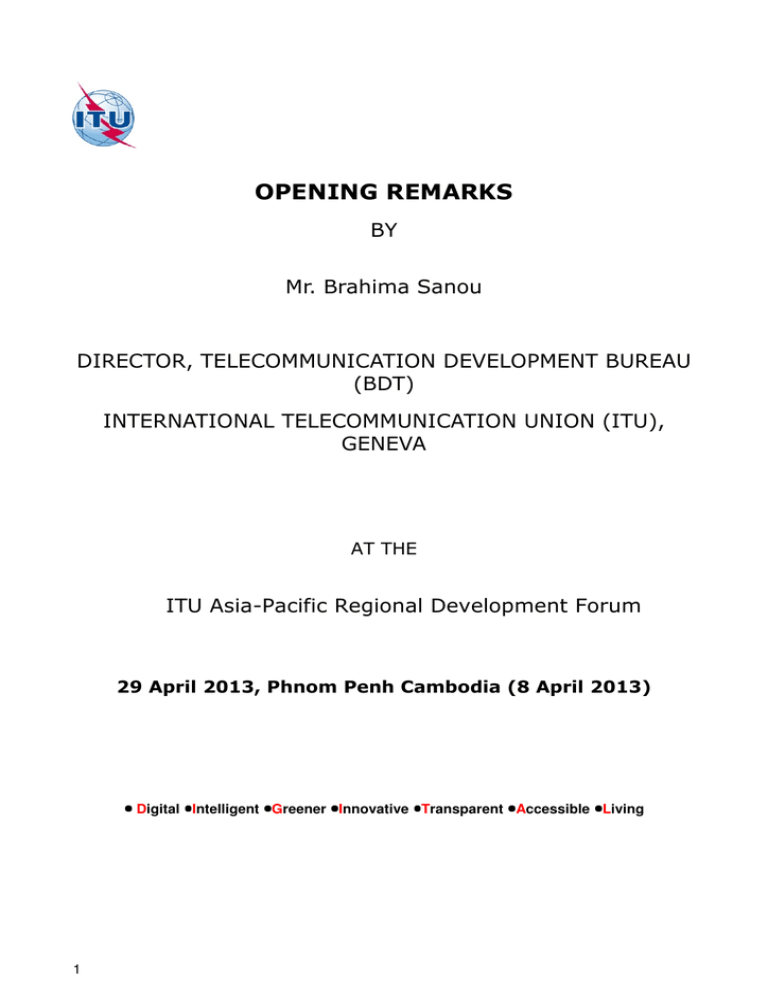
OPENING REMARKS BY Mr. Brahima Sanou DIRECTOR, TELECOMMUNICATION DEVELOPMENT BUREAU (BDT) INTERNATIONAL TELECOMMUNICATION UNION (ITU), GENEVA AT THE ITU Asia-Pacific Regional Development Forum 29 April 2013, Phnom Penh Cambodia (8 April 2013) ● Digital ●Intelligent ●Greener ●Innovative ●Transparent ●Accessible ●Living 1 • H.E. Dr. Dr. Sok An, Deputy Prime Minister, Royal of Cambodia • H.E. Mr. So Khun, Minister of Posts and Telecommunications of the Royal Government of Cambodia • Excellences Ministers and other high dignitaries here present • Dr. Hamadoun Touré, Secretary-General, ITU • H.E.Mr. Chakrya Moa Chairman of TRC Distinguished delegates, Ladies and Gentlemen, A very good morning to you all and welcome! It gives me great pleasure and honor to be here in Cambodia – home to the Angkor Wat, a truly historical marvel. Before going any further, I would like to thank the Royal Government and the people of Cambodia for the very warm welcome and the hospital extended to all of us and for the excellent facilities put at our disposal. Once again, a big thank you. Let me thank you personally Your Excellency Dr. Sok An, Deputy Prime Minister, royal Government of Cambodia for gracing this opening ceremony with your presence. The Regional Development Forum (RDF) is an annual event aimed at providing a platform for information and best practice sharing on opportunities and challenges in the region with respect to policy, technology, regulatory and economic matters. It is about open dialogue by stakeholders – ITU Member States, Sector Members, Academia, industry and other stakeholders. The RDF of this year comes just a day before the 2013 Regional Preparatory Meeting (RPM) for the Asia and the Pacific Region. Both meetings provide us with a unique opportunity to prepare for the next World Telecommunication Development Conference to be held in Egypt from 31st March to 11 April 2014. The theme of this RDF is Asia-Pacific: Smartly Digital. This theme was well selected because of positive and impressive ICT trends in this region. ITU figures show that by end of 2013, there will be 89% mobile-cellular subscriptions per 100 inhabitants in 2 Asia and the Pacific Region. Of the estimated 2 billion broadband subscriptions worldwide, Asia and the Pacific will account for 895 million. Six out of 25 top performers on the ICT Development Index (IDI-2012) are from Asia-Pacific. . Looking at these figures, we can certainly say that Asia-Pacific has gone digital. Distinguished Delegates, Ladies and Gentlemen, Let me turn to some key issues that will be addressed by this RDF. Harnessing Digital Opportunity through Broadband is one of the key sessions that will be discussed. Broadband networks, applications and services empower individuals, contribute to access to knowledge and the free flow of information and ideas, and enable countries to participate in the global digital economy and reduce poverty. How can we together make these technologies universally accessible to all citizens in the region? I leave it to our panelists to answer. Digital empowerment for ALL is another topic that will be discussed. Like in other regions, large populations live in rural and remote areas, many citizens have financial impediments, there are people with disabilities, and there are people with low literacy levels. How then can we integrate and include these people into the smart digital world? Again, this is food for thought for this RDF. We will have sessions on creating smarter, safer and greener society. The final session is more forward looking. It glances into the future to see how we could truly create a digital, intelligent, greener, innovative, transparent, accessible, living, for all the citizens in the region. Our panelists who are from diverse backgrounds and very highly qualified will provide their insights on this as well. Ladies and Gentlemen, Just to spice this RDF, I am pleased to inform you that within the framework of implementing of the outcomes of the last WTDC, I recently launched a number of global initiatives. First, the m-Powering Development initiative. Building on the rapid growth and the wide spread of mobile communications, this initiative seeks to optimally harness the mobile technology for sustainable development through the delivery health services, education, banking and other businesses. Another key area in which we have successfully assisted countries is emergency telecommunications and climate change. Natural disasters are frequent in this 3 region and claim hundreds of human lives and cause a lot of economic losses. In this regard, I launched the Smart Sustainable Development Model which seeks to link ICT for sustainable development with ICT for disaster management. Finally, as new technologies emerge and get introduced, countries need institutional and human capacity building. In this regard, I recently launched the ITU Academy which is a platform for sharing training opportunities across the world. My colleagues will present these initiatives in the panel sessions to come. For those of you who will participate in the RPM, I will have the pleasure to share with you more detailed work that has been accomplished during the past two years as we embarked on the implementation of the Hyderabad Action Plan. My report on that covers other areas that include infrastructure, ICT Applications and Services, Cybersecurity, Enabling Environment, digital inclusion, issues of concern to least developed countries, landlocked developing countries, and small island developing states, Child online protection, girls in ICT, data collection and statistics in ICT. Ladies and Gentlemen, On this note, let me wish you an open, interesting and exciting exchange of ideas. I thank you. 4
